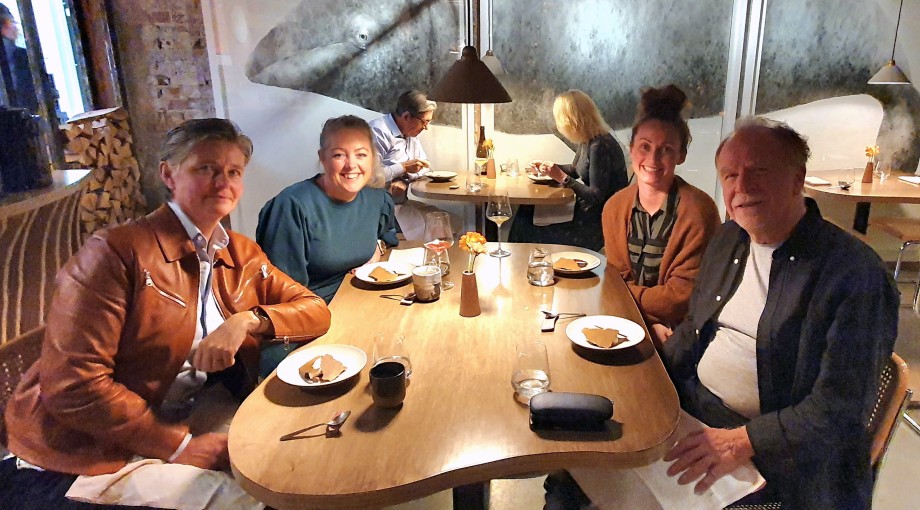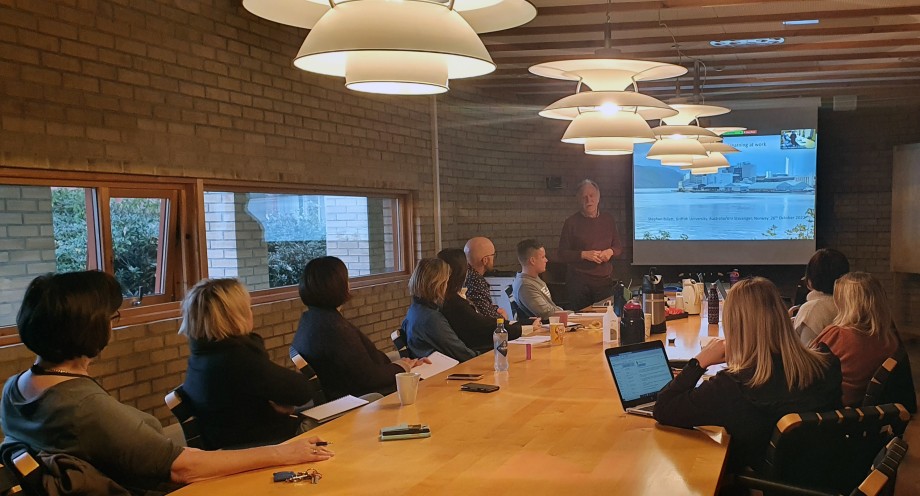Professor Stephen Billett from Griffith University Australia, is involved in several of SHARE – Centre for Resilience in Healthcare's projects. He is visiting the research center for three weeks and encourages others to engage in similar activities.
“International collaboration provides a means for researchers and practitioners across the world to engage with the same or related issues in ways that also acknowledges differences at the national, cultural and social levels. There has, perhaps, never been a greater need for further collaborations given the kind and extent of issues that researchers and practitioners are commonly seeking to address, given the array of challenges that are global and yet have been both exacerbated and constrained in recent years by Covid pandemic. Hence, the opportunity to meet, discuss, share, compare and contrast approaches, explanatory bases, and ways of understanding these issues offers ways forward”, says Billett, who is a Professor of Adult and Vocational Education.
The opportunity for him to engage and work with colleagues from the University of Stavanger on issues associated with the development of capacities for healthcare workers and healthcare systems to be more resilient is addressing a need that according to him has never been stronger.
“Across the world, healthcare system and workers are needing to be innovative, adaptive and adopt new ways of working in response to ageing populations, the pandemic, changing technologies and heightened expectations of communities. The work of the SHARE - Centre for Resilience in Healthcare is a good example of where collaborative effort is required to be enacted to address its goals”, states Billett.
Collaborative research projects
The focus for the activities in this visit comprises engaging with UiS colleagues from SHARE around issues of collaborative learning that supports individual and systemic resilience in healthcare systems. This collaboration through systematic reviews of literature, considerations of learning tools that can support those forms of resilience and their appraisal in different kinds of practice settings. Moreover, advancing the publications from this research is a key priority.

Engaging with his UiS-colleagues Kristin Akerjordet, Ingunn Aase and Kristin Laugaland from the “QUALinCLIN - Aiming for quality in nursing home care” project provides an opportunity to collaborate and engage with insights being developed through empirical work in aged care facilities here in Norway, including pilot testing and evaluating digital educational resources within clinical education. This includes developing understandings about how student nurses best can come to experience, engage and contribute to healthcare in these facilities, partially through the doctoral work of Ingrid Dalsmo.
“This project is becoming increasingly important because these kinds of facilities. Rather than homes for the aged, they have become key elements of the healthcare system in Norway. We have discussed the use and testing of post-practicum interventions to assist the students’ nurses’ learning from and through their placements in aged care”, says Billett.
Within the "Resilience in Healthcare" project, he has been collaborating closely with Cecilie Haraldseid-Driftland, and PHD candidates Kristy Stohlmann and Heidi Janne Dombestein and also, remotely, Siri Wiig with a rapid literature review on the qualities of on-line learning tools that also involves his colleague from Griffith University, Anh Hai Le. This review has sought to identify and appraise educational tools that can support individual and system resilience in healthcare. This collaboration will continue with further papers arising from the implementation of a learning tool to enhance resilience in healthcare work.
Presented his own considerations
During his stay, he also set aside time to give a presentation with the title “Integrating innovations and learning at work” during the research centre's professional meeting. The key messages from the presentation are associated with how activities in workplaces can be both generative of two forms of change (i.e., change in what workers know, can do and value - their learning) and also innovations in occupational practices. Importantly, these two processes co-occur and are interdependent, and arise through responding to workplace challenges. Whilst the future of occupational and workplace requirements is hard to predict, we can be certain that workers of all kinds and classification will be continually confronted by requirements to both learn and to innovate in and through their practice.

Healthcare is by far no exception to these requirements. Hence, finding ways in which these two processes can be drawn together and made more interdependent stands to achieve the dual goals of workers’ ongoing learning, on the one hand, and, on the other hand sustaining effective and safe healthcare practice. This includes the incremental and transformative changes to practice as the requirements for work change. Such considerations exist at the individual, workplace, and occupational level, and as such have both individual and collective outcomes and innovative practices arise in and through these circumstances. So, the potential is not only for individual development, but also system change and enhanced viability, and much of it in and through work practice.
“The response from the participants indicated that some of them could identify clear alignments between these concepts and their work within SHARE. This included potential contributions to be considering more broadly how both individual and workplace resilience can arise through practices in workplaces, as has been the case across much of human history. However, perhaps different from the past is that the kinds of challenges healthcare workers and systems confront now may require support and guidance from educators or professionals, which is a challenge for educational systems”, he says in conclusion.
Text: Eigil Kloster Osmundsen
Other news from SHARE
Global State of Patient Safety 2023 – Supporting Leaders
At a time when healthcare is at a crossroads, the "Global State of Patient Safety 2023 – Supporting Leaders" seminar hos...
Oslo University Hospital is a new partner in SHARE
As a new partner, Section for Acute and Pre-hospital care at Oslo University Hospital strengthens research on prehospita...
Gathering International Researchers at Sola
SHARE – Center for Resilience in Healthcare at UiS is hosting Resilient Health Care Society’s summer conference at Sola ...
Prestigious EU grant for Health Services Research
Researchers at the University of Stavanger have received 6 million euros from the prestigious EU research program Horizo...
A Care Strategy for caregivers and care receivers by the EU
During the conference “From Knowledge to Action – the role of carers is changing?” in Oslo on March 16 Stecy Yghemonos h...
Patients and families engaged in resilient healthcare systems
Patients and their families contribute to the resilience of healthcare systems. This is particularly evident as global h...
Two worlds colliding: exploring the boundaries between system resilience and individual resilience
A recent webinar organised by the Resilient Health Care Network focused on the intersection of individual psychological ...







